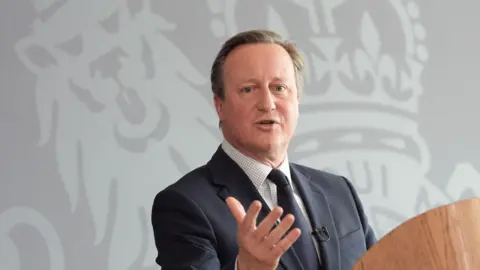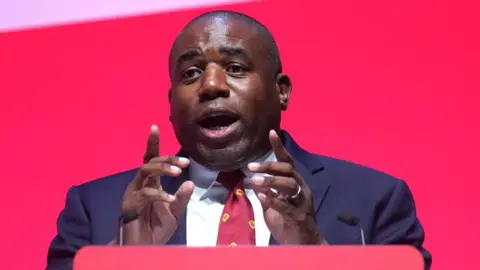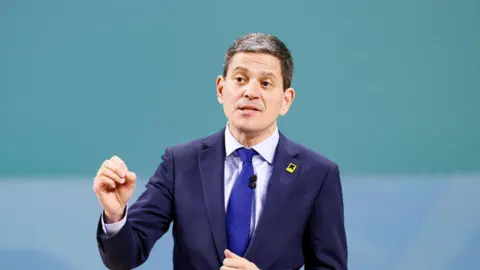How foreign affairs could shape votes at home
 PA Media
PA MediaPolitics this week may seem to have been all about the controversial defection of a now former Conservative MP and the fall-out from the local and mayoral elections.
But behind the headlines a new front opened in the political skirmishing ahead of the coming general election.
Unusually, it involved foreign policy.
Three men gave three speeches - a former foreign secretary, the current holder of the office and the man who wants his job: David Miliband, who had the role from 2007 to 2010; David, Lord Cameron; and David Lammy, the shadow foreign secretary.
Despite their different perspectives, the three Davids shared a remarkable consensus about the challenges Britain and its allies face.
All three spoke of the collective dangers posed by China, Russia, Iran and North Korea.
Lord Cameron called them “an axis of authoritarian states” acting together “in an attempt to undermine us and our allies”.
Mr Lammy spoke of the risks of an “antihegemonic coalition united” against the West.
Mr Miliband – currently head of the International Rescue Committee in New York - referred to “an aggressive Russia... bolstered by strong Chinese support”.
All three also spoke of the need for Europe to do more to defend itself against this threat.
Mr Lammy and Mr Miliband were most explicit in warning that US support for European defence could diminish regardless of who wins the presidential election.
Mr Miliband said Europeans should “hedge against the prospect that it will not be plain sailing in the event that President Biden is re-elected”.
Mr Lammy said the focus of the US was shifting to the Indo-Pacific and Europe had to “do more to look after our own back yard”.
Cameron
Yet if there was some shared analysis, there was less consensus about the remedy.
Lord Cameron’s answer was for the West to be more assertive in defending its interests. Too many allies, he said, were adopting a kind of “defensive crouch” when instead they should have the courage to act.
In his speech at the National Cyber Security Centre, he said western nations should give their foreign policies a harder edge.
That meant forging new alliances, making security a priority, defending values more boldly, and showing greater strategic patience.
His one specific call was for a new target for NATO members to spend 2.5% of their national wealth on defence. He claimed this was a point of difference with Labour.
The Conservatives promise to reach that target by 2030; Labour says it will do so the same “as soon as resources allow”.
 Getty Images
Getty ImagesLammy
David Lammy’s prescriptions had a different emphasis, with political signals for both sides of the Atlantic.
In his speech at the Hudson Institute, a highly conservative think tank in Washington he too spoke of the need for deeper cooperation with allies.
For his immediate audience, that meant emphasising a Labour government would work with Donald Trump if he won a second term.
Mr Lammy claimed Mr Trump was “often misunderstood”. He said Mr Trump did not want the US to abandon Europe, merely that Europeans should “do more to ensure a better defended Europe”.
For voters back home, Mr Lammy promised deeper cooperation with European allies. He said a future Labour government would not re-join the EU, the Single Market or the Customs Union.
But it would seek “a new geopolitical partnership with Europe, enshrined in a new UK-EU security pact”.
Miliband
In a lecture in London, David Miliband went much further.
He said a Labour government should indeed forge a new security pact with the EU.
But it should deal not just with defence and foreign affairs but also climate security, food security, health security and energy security.
He said the UK should agree a new high-level political declaration with the EU, setting out a framework for future cooperation.
That could involve regular dialogue between British and EU foreign affairs officials, the foreign secretary attending some meetings of EU counterparts, joint peacekeeping operations and defence procurement arrangements.
The problem is that while diplomats in London told me they liked much of Lord Cameron’s speech, they also know he might not be in office for long.
The foreign secretary is trying to score fast diplomatic runs before he loses his wicket. But will his policy ideas survive the general election?
 Getty Images
Getty ImagesAs for Messrs Lammy and Miliband, their focus on Europe poses a big question. Is the EU ready for a renewed relationship with the UK? One European ambassador told me: “My fear is that we are not ready to listen. There are still many people in the system bruised by Brexit who think it’s too early.”
It is a truism of politics that foreign affairs rarely change the minds of voters. But that may be less true this time around.
The war in Gaza shifted votes in last week’s local elections. Spending more money on defence means less for schools and hospitals.
The jobs of many voters depend on access to foreign markets. Immigration, pandemics and climate change are at the front of many voters’ minds.
Right now foreign policy is often the purview of dry speeches to think tanks. Come the general election it may take centre stage.
